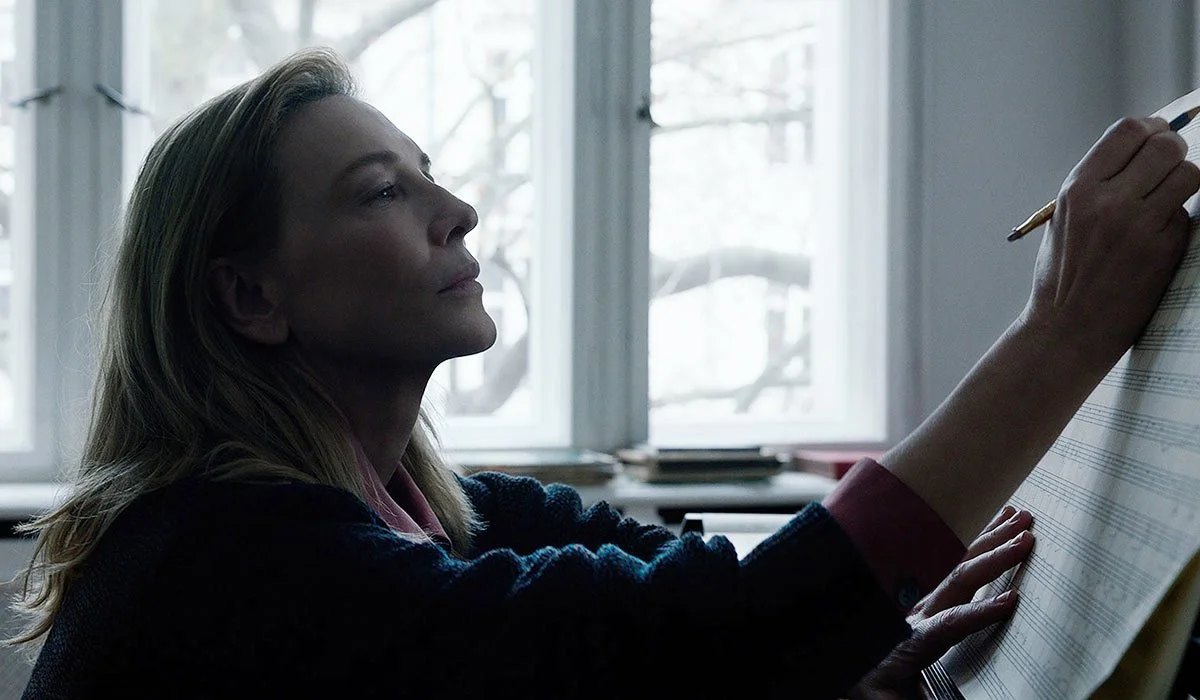Tár
Directed by Todd Field
Running time: 2hr38 | REVIEWED BY GUY LODGE
Cate Blanchett in Tár
All my life, even before it became a job requirement for me as a trade paper critic, I’ve been a stickler for sitting through the closing credits of films: not just on the off-chance of a post-credit sting, or for the always-late soundtrack details, but because there’s something quite restful and rewarding about watching the various names who made your evening’s entertainment scroll by. In the first of several head-jerkingly unexpected formal gambits, Todd Field’s angular, audacious and quite extraordinary Tár disoriented me by offering that pleasure rather earlier than usual. Two minutes into the film, after a cryptic and immediately alluring screenlife prologue involving catty texts and the regally bent, royally hung-over head of Cate Blanchett, the full credits roll in all their unhurried glory over a black screen, and the film begins.
From the get-go, then, Tár aims to disrupt conventional rhythms — as does its eponymous protagonist Lydia Tár (Blanchett), a celebrated classical conductor known worldwide for her unorthodox approach to music, but known only to her most intimate inner circle for personal dealings that cross the line from unorthodox to dysfunctionally toxic. She has every award available to her art, her lifelong dream job conducting the Berlin Philharmonic, a cavernous Architectural Digest apartment that she shares with her beautiful, gifted violinist partner Sharon (Nina Hoss) and their angelic moppet of a daughter — everything, in other words. And when has having everything ever boded well for a character? Tár feels jinxed from the film’s first full scene, an agonisingly obsequious onstage Q&A — played by Blanchett with a performative graciousness that feels wryly knowing and meta — in which her manifold achievements are trotted out like a list of potential charges against her.
Yet it takes us time to spot the makings of her downfall, in part because Field’s film so cleverly guards our access to her, gradually peeling away her shellacked layers of public decorum and lucidity and wit, making us — and, one feels, the forever surrounded Tár — wait and wait to get her alone. This isn’t a typically romantic portrait of unhinged genius: the maestro (and don’t you dare call her maestra) here has an implacable core of self-knowledge and self-belief that make her spiralling sociopathic impulses all the harder to square with her sleek-suited image. Suffice it to say that MeToo-era queries of abuse, offence and cancellation are raised in the film’s complex, prickly inquiry; you can probably guess that Field and Blanchett have no interest in tidy answers.
Not since Carol has Blanchett got to negotiate this degree of inner turmoil on screen; not since her Oscar-winning turn in Blue Jasmine has a part stretched to both the most icily contained and hotly raging extremes of her range. In a film expressly about the power granted by untouchable brilliance, hers makes this impossible moral minefield of a woman warm to the touch; the unpredictable tics and intricately detailed facial maps of thinking that she grants Tár make this nearly three-hour film consistently riveting, as tense as it is languid.
Field knows his way around richly unresolved characters: his previous films In the Bedroom and Little Children bristled with interior conflict and contradiction. But after a 16-year hiatus from directing, he’s returned a more imposing, uncompromising and dangerous filmmaker, asserting his own rigorous craftsmanship and structural daring even in the face of such a formidable lead performance. As teased by that premature closing-credits roll, this is a film out to make its audience observe people, places and emotional spaces they’d ordinarily walk away from, and to take its precious time doing so. Tár herself would be proud, or seethingly envious.
TÁR (2022) Written by Todd Field | Shot by Florian Hoffmeister | Edited by Monika Willi
